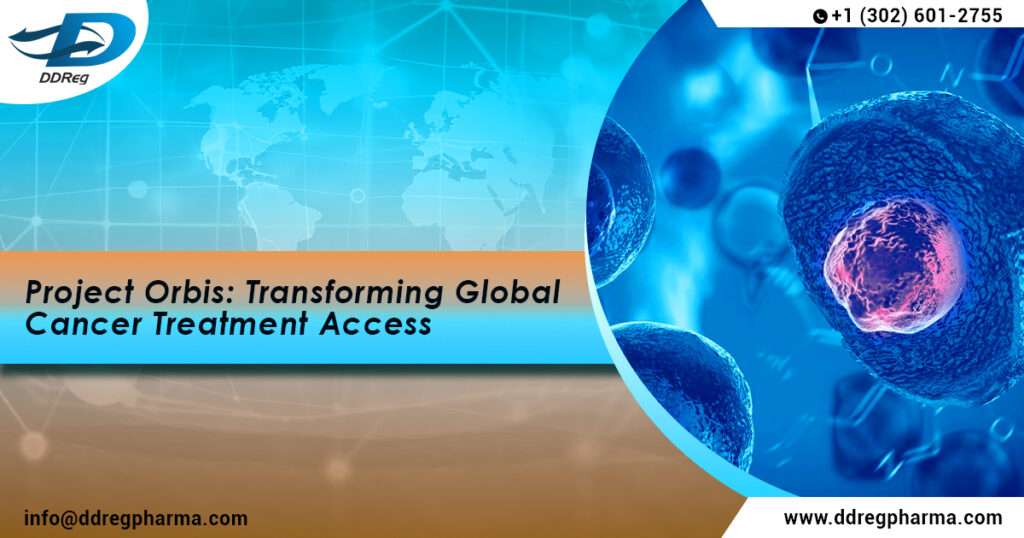Cancer continues to be a major cause of mortality around the world, highlighting the urgent need for innovative strategies to deliver life-saving treatments to patients. In this pursuit, U.S. Food and Drug Administration (FDA) launched an initiative called Project Orbis in 2019, to transform the global regulatory framework for oncology drugs. Project Orbis has showcased the power of international collaboration by expediting the approval process for cancer therapies in participating countries. For pharmaceutical companies, grasping the significance of this initiative is crucial for ensuring timely access to global markets and providing essential treatments to patients in need.
What is Project Orbis?
Project Orbis is an FDA-led framework designed to harmonize and streamline the regulatory review of oncology drugs. Through this initiative, the FDA collaborates with global regulatory agencies to simultaneously review and approve cancer therapies, thereby reducing delays in patient access to innovative treatments.
The initiative includes a strong network of partner agencies, like:
- Health Canada
- Therapeutic Goods Administration (TGA), Australia
- Medicines and Healthcare products Regulatory Agency (MHRA), UK
- Swissmedic, Switzerland, and others.
Features and Types of Project Orbis
- Collaborative Review Process
Project Orbis fosters transparency and dialogue among regulatory agencies by enabling simultaneous submission and review of applications. This eliminates redundant reviews and allows agencies to share expertise and resources effectively.
- Patient-Centric Approach
The initiative prioritizes therapies for critical unmet medical needs and ensure that innovative cancer treatments reach patients faster. This is particularly significant for rare or aggressive cancers where time is of the essence.
- Global Harmonization
By aligning regulatory processes across countries, Project Orbis reduces disparities in approval timelines, ensuring equitable access to therapies across regions. For pharmaceutical companies, this represents an opportunity to penetrate multiple markets simultaneously with a harmonized strategy.
There are 3 Orbis types that have their own submission timelines; Type A (application submission to Project Orbis Partner ≤ 1 month of FDA submission); Type B (application submission to Project Orbis Partner > 1 month of FDA submission); Type C (submission can be made any time after FDA submission depending on the Project Orbis Partner guidelines). Since the inception of Project Orbis, as of November 2024, the FDA has granted approval to 100 applications that have been made for oncology drugs with the aim to expedite approval to life-changing therapies. Some of these products are currently under review by other global regulatory agencies, while others have received approval.
Impact on Pharmaceutical Manufacturers
For pharmaceutical firms, Project Orbis offers several strategic advantages:
- Companies can achieve faster approval for oncology products across multiple jurisdictions, reducing the time-to-market significantly.
- The unified application process minimizes duplication of effort and resources, allowing firms to allocate their regulatory budgets more effectively.
- With synchronized approvals, manufacturers can enhance their global market presence and establish brand credibility by demonstrating compliance with multiple leading regulatory agencies.
However, applicants must ensure that their clinical trial data, manufacturing processes, and submission documents meet the stringent requirements of all participating agencies. Partnering with specialized regulatory service providers can help through these complexities and optimize outcomes.
Challenges and Future Directions
The differences in regulatory frameworks, data requirements, and market dynamics across countries can complicate the harmonization process. Smaller pharmaceutical companies may find the simultaneous submission process resource-intensive without the right support.
Moving forward, expanding the network of participating agencies to address regional complexities will maximize the impact of Project Orbis. The success of this initiative would be an example to encourage similar collaborative frameworks in future for other therapeutic areas.
Conclusion
Project Orbis is a transformative step for global health, serving as a lifeline for millions of patients waiting for effective cancer therapies. By uniting global regulatory agencies and industry stakeholders, it exemplifies how collaboration can overcome barriers to access and deliver innovative solutions faster.
At DDReg, we help companies navigate the complexities of global regulatory requirements, ensuring compliance while accelerating access to markets. From dossier preparation to market-specific insights, our expertise ensures a seamless journey through initiatives like Project Orbis. Reach out to us today and let’s shape the future of cancer treatment access together. Read more from us here: The Impact of ISO IDMP Standards on Data Management for Medicinal Products

